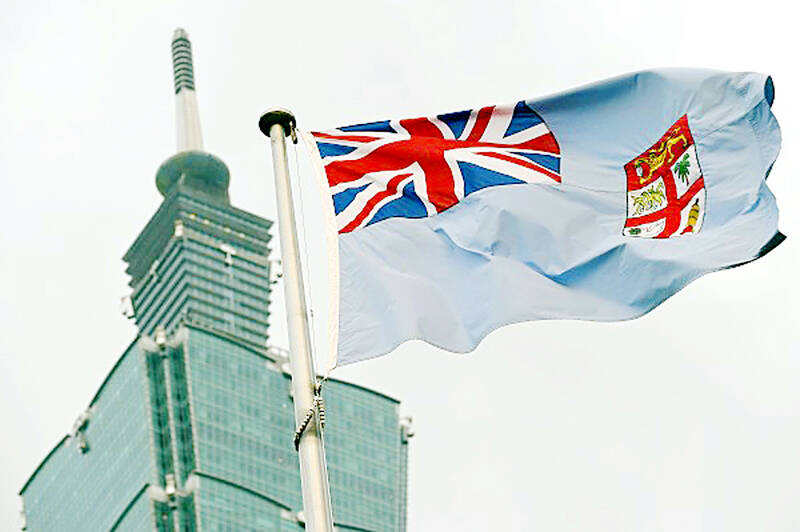The decision to restore the Taipei Trade Office in Fiji to its former name, which includes the word Taiwan, was reversed due to pressure from China, the Ministry of Foreign Affairs said on Wednesday.
Fiji on March 24 issued a note verbale to the office, saying that its name was changed to “Trade Mission of the Republic of China (Taiwan) to the Republic of Fiji,” retroactively effective from March 15.
However, “under peremptory pressure from China,” the government of Fiji changed the name of the office back to the “Taipei Trade Office in Fiji,” the ministry said in a news release.

Photo: Chen Chih-chu, Taipei Times
The ministry “fiercely condemns China’s actions of suppressing Taiwan and belittling its sovereign status in the international arena again,” it said.
The Chinese embassy in Fiji protested the initial name change and threatened to take retaliatory measures, the ministry said.
Chinese Vice Minister of Foreign Affairs Ma Zhaoxu (馬朝旭) exerted pressure on Fiji when he visited the country in April, it said.
The Fijian government succumbed to Chinese pressure after discussing the issue in several Cabinet meetings, it said, calling it “deeply regretful.”
Taiwan has been promoting exchanges and cooperation in agriculture and fisheries, healthcare, education and talent cultivation in Fiji, benefiting Fijians with concrete projects since the office was launched in 1971, the ministry said.
Adhering to the values of freedom and democracy, Taiwan would continue to “share successful experiences with countries in the Pacific region, work together to maintain regional peace and stability, and strive for Taiwan’s due international status,” the ministry added.
Beijing previously pressured Fiji to change the office’s name to the Taipei Trade Office in Fiji in 2018.
Taiwan typically uses the term “Taipei” instead of its official name “Republic of China (Taiwan)” when naming its de facto embassies in most nations, mainly because the host nation adheres to a “one China” policy.
Fijian Prime Minister Sitiveni Rabuka has since December last year been seeking to alter his predecessor’s pro-China approach since taking over from former Fijian prime minister Voreqe Bainimarama, who was in office for 16 years.
Rabuka in January announced that his government would end a police training and exchange agreement with China.
The agreement “hangs in the balance,” as the Chinese embassy said it cannot understand why the deal cannot be continued, local media FBC News reported on Tuesday.
Whether Fiji can unilaterally terminate the agreement remains to be seen.
Additional reporting by CNA

Taiwan is to commence mass production of the Tien Kung (天弓, “Sky Bow”) III, IV and V missiles by the second quarter of this year if the legislature approves the government’s NT$1.25 trillion (US$39.78 billion) special defense budget, an official said yesterday. Commenting on condition of anonymity, a defense official with knowledge of the matter said that the advanced systems are expected to provide crucial capabilities against ballistic and cruise missiles for the proposed “T-Dome,” an advanced, multi-layered air defense network. The Tien Kung III is an air defense missile with a maximum interception altitude of 35km. The Tien Kung IV and V

The disruption of 941 flights in and out of Taiwan due to China’s large-scale military exercises was no accident, but rather the result of a “quasi-blockade” used to simulate creating the air and sea routes needed for an amphibious landing, a military expert said. The disruptions occurred on Tuesday and lasted about 10 hours as China conducted live-fire drills in the Taiwan Strait. The Civil Aviation Administration (CAA) said the exercises affected 857 international flights and 84 domestic flights, affecting more than 100,000 travelers. Su Tzu-yun (蘇紫雲), a research fellow at the government-sponsored Institute for National Defense and Security Research, said the air

A strong continental cold air mass is to bring pollutants to Taiwan from tomorrow, the Ministry of Environment said today, as it issued an “orange” air quality alert for most of the country. All of Taiwan except for Hualien and Taitung counties is to be under an “orange” air quality alert tomorrow, indicating air quality that is unhealthy for sensitive groups. In China, areas from Shandong to Shanghai have been enveloped in haze since Saturday, the ministry said in a news release. Yesterday, hourly concentrations of PM2.5 in these areas ranged from 65 to 160 micrograms per cubic meter (mg/m³), and pollutants were

Taiwan’s armed forces have established response protocols for a wide range of sudden contingencies, including the “Wan Chun Plan” to protect the head of state, the Ministry of Defense (MND) said today. After US President Donald Trump on Saturday launched a series of airstrikes in Venezuela and kidnapped Venezuelan President Nicolas Maduro, concerns have been raised as to whether China would launch a similar “decapitation strike” on Taiwan. The armed forces regularly coordinate with relevant agencies and practice drills to ensure preparedness for a wide range of scenarios, Vice Minister of National Defense Hsu Szu-chien (徐斯儉) told reporters before a